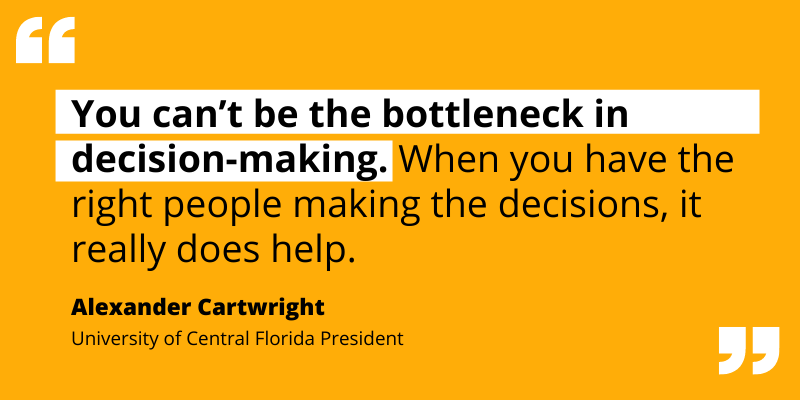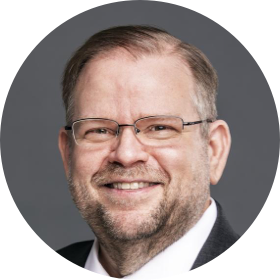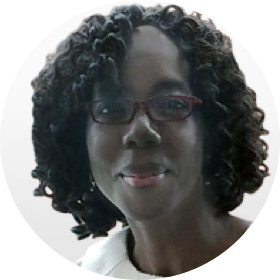
We sat down with Dr. Alexander Cartwright, President of the University of Central Florida (U.C.F.), for the Weekly Wisdom Podcast. He spoke about receiving an enormous philanthropic gift, partnering with community colleges, and new leadership lessons learned during the pandemic.
How to Use Philanthropic Gifts
This past spring, President Cartwright learned that U.C.F. had been tapped by philanthropists MacKenzie Scott and Dan Jewett to receive $40 million, the largest gift in the school's 58-year history.
"It really did almost sound like it was a scam," he told us. "But the more that I talked to them, the more I realized that they knew so much about the institution: our retention rates, how much we have expanded, that we’re a Hispanic-serving institution, that we’ve improved our graduation rates for underrepresented students. And they knew about our size and scale and our connection to UIA, which is also an important part of what impacted us. And then I started to realize that this might be actually true. The money showed up within a week. We were, of course, amazed to see $40 million show up that quickly.
"It’s an incredible opportunity for this institution," he went on. "We’ll use it to invest in our endowments that will benefit student success, the faculty and staff, and all of the great research that they are doing and how they’re impacting society. We want to continue to grow the endowment. We need to be thinking of how we can leverage an opportunity like this to do even more great things for this institution long-term."
Regional Partnerships
Like many public universities, U.C.F. is committed to partnering with local community colleges. President Cartwright described the regional importance of fostering a positive culture around higher education.
"You need to put the students’ best interests at the forefront," he said. "This is about how we get the most students the opportunity to get into a university. We’re willing to help achieve their dreams and recognize that not everybody is going on the same path. If you start from thinking about 'What’s my enrollment?' and 'How am I going to grow the revenue streams?', that’s a different conversation. Whereas, if you’re thinking about how you can do what’s in the best interests of the community, the region, that changes all of this."
Focusing on U.C.F.'s partnership with Valencia College, he explained, "We started thinking about how do we produce the workforce that’s needed to drive the economy in this region, and we couldn’t do it alone. We share a building downtown with Valencia, and we’ll continue to seek value in our partnership, because I think it is about how we make sure that they’re able to help us with the economic development. As the economy grows in this region, as we’re able to provide the workforce that’s needed, there is tremendous benefit to us as an institution, and so we have to go away from the near-term, budget-related conversations to the long-term benefit to society."
Pandemic Lessons
In our previous conversation with President Cartwright, he'd been at U.C.F. for just six months, starting his job shortly after the lockdown began. We asked if he learned any new lessons about leadership under extreme conditions.
"The biggest lessons were around our ability to be adaptive, to be innovative, to think about how we can do things differently, and to work with fabulous people that make the best of every situation," he said. "U.C.F. is a young institution. We’ve grown tremendously over the last 30 years, and that has created a can-do attitude. It’s within the ethos of everything that we do. So working with our students, faculty, and staff, we were able to think about different ways to do things. How to bring people back in person? What do we do in our residence halls? How do we run events? We did all of that during the past year. And this fall is another shift where we have a lot more in-person classes. Everybody has been amazing, thinking about how we can be more flexible."
President Cartwright shared an example of success: "The big one that I like to think about is office hours. When our faculty were offering them online, they started to realize that a lot more students would actually come to office hours that were available. It’s the flexibility, but also it’s the leveling of power. I'm actually able to attend a meeting with someone, and I'm in my environment and they’re in theirs, so we’re much more equal. Students are more willing to reach out to their faculty.
"We saw a lot of creativity, too," he added. "A faculty member using their shower door as a whiteboard – that’s incredibly creative. And others were doing all sorts of research activities around COVID-19. I just can’t say enough good things about the people that we have here at this institution, their ability to accept change, to say, 'Let’s make things happen.' And I'm looking forward to what we’ll be able to do in the future as things change further."
Realities of Leadership
Of course, there was a lot to overcome en route to these positive outcomes.
"We’ve had to make decisions very rapidly," President Cartwright acknowledged, "and that’s hard on all of us. The biggest lesson for leadership, I think, is to show compassion. Be clear that you’re always making decisions with the best interests of the institution, faculty, staff, and students in mind. Always try to put the institution in a position where it can be successful. Talk a lot about compassion and care. We have to go back to our principles of community, and that we really do care and love each other. Sometimes things are going to be difficult, but we’re just going to keep helping each other to do the most that we can do."
He emphasized how leaders must recognize their limitations. "That’s a tough thing to learn," he recalled, "especially if, like me, you were a faculty member who had to be so involved in so many things that your natural tendency is to want to be involved in everything. And you start realizing that you actually need to ensure that people are empowered around you, and your job is to help that environment continue to move more rapidly. You can’t be that bottleneck in terms of decision-making. And when you have the right people making the decisions, it really does help.
"And I would say the last lesson is just listening," President Cartwright added. "Faculty, staff, students, we’re very blessed to have that type of talent. Recognize that they’re going to have suggestions, solutions much better than you would have ever thought of, and if you’re willing to pick up on those ideas and act on them, I think that’s the best thing you can do as a leader. Realize it is a team effort to lead an institution of this size."
Thinking Gray
One of President Cartwright's go-to books for leadership advice is Steve Sample's The Contrarian's Guide to Leadership, specifically the chapter on "thinking gray," which verified a practice he adopted during his early days as a faculty member.
"I was always willing to listen to all of the different arguments, even if I had a different viewpoint," he said. "If you’re able to do that, you will sometimes make decisions different than your own viewpoint, because you’re always thinking about the collective. I think that’s an incredibly powerful tool, and it takes practice."
This connects to the best career advice that he ever received. "Empowerment is about valuing the people around you," he told us. "How do you empower people, how do you thank them for what they’re doing? Those things make an environment where people really want to be part of what you’re trying to accomplish, because they realize that it’s not about you as an individual, but rather that you’re always pushing together to get the institution to where it needs to be."
As for the advice that President Cartwright most consistently gives aspiring higher ed leaders, and he simply passes along this same wisdom. "I think it’s important that people fundamentally realize that you care and that you value all of those people that are around you," he said. "And it isn’t just people at your level in the institution. Everybody has a role to play. You walk on our campus; you see how immaculate our landscaping is here and how beautiful the campus is. When you think about our student success, it’s about our advisors. When you think about in the residence halls, it’s all the people who come together to make this work. We have to do all of these things together, and we need to value and respect everybody for all that they’re doing to make these things possible."
Note: This interview in the Weekly Wisdom Series originally aired on August 30, 2021 as part of the University Innovation Alliance’s Innovating Together Podcast, appearing live onFacebook, Twitter, andLinkedIn.
Links Mentioned in This Episode
• University of Central Florida
• MacKenzie Scott and Dan Jewett ("Billionaire MacKenzie Scott, ex-wife of Jeff Bezos, marries Seattle science teacher," CBS News, 3/8/21)
• Student success ("A System for Student Success: A Conversation With Tim Renick, Executive Director, National Institute for Student Success at Georgia State University," UIA, 8/5/21)
• Valencia College
• Our previous conversation with President Cartwright ("Servant Leadership and Empowerment: A Conversation With Alexander Cartwright, University of Central Florida President," UIA, 3/4/21)
• The Contrarian's Guide to Leadership by Steven B. Sample
Bios of Guest and Co-Hosts

Guest: Alexander Cartwright, President, University of Central Florida
Dr. Alexander N. Cartwright became U.C.F.’s sixth president in March, 2020. He previously served as chancellor of the University of Missouri (M.U.) with an appointment as a College of Engineering professor in the Electrical Engineering and Computer Science Department. He led M.U. through strategic enrollment, research growth, and a $1.3 billion fundraising campaign, also advocating for student success initiatives, equity and diversity, improved retention and graduation rates, and post‐graduation outcomes. Dr. Cartwright came to M.U. from the State University of New York (S.U.N.Y.), where he served for three years as provost and executive vice chancellor, overseeing academic policy and enrollment management. An internationally recognized researcher and scholar in the area of optical sensors, he is a fellow of the American Association for the Advancement of Science, S.P.I.E. (the international society for optics and photonics), and the National Academy of Inventors. Dr. Cartwright has won the National Science Foundation CAREER Award, the Office of Naval Research Young Investigator Award, and the 2002 S.U.N.Y. Chancellor’s award for excellence in teaching. A native of the Bahamas and a first-generation college student, Dr. Cartwright holds a doctorate in electrical and computer engineering from the University of Iowa. He and his wife Melinda have two children, Alyssa and Andrew.

Co-Host:Bridget Burns, Executive Director, University Innovation Alliance
Dr. Bridget Burns is the founding Executive Director of the University Innovation Alliance (UIA). For the past decade, she has advised university presidents, system chancellors, and state and federal policy leaders on strategies to expand access to higher education, address costs, and promote completion for students of all backgrounds. The UIA was developed during Bridget’s tenure as an American Council on Education (A.C.E.) Fellowship at Arizona State University. She held multiple roles within the Oregon University System, including serving as Chief of Staff and Senior Policy Advisor, where she won the national award for innovation in higher education government relations. She was a National Associate for the National Center for Public Policy and Higher Education, and has served on several statewide governing boards including ones governing higher education institutions, financial aid policy, and policy areas impacting children and families.

Co-Host: Marjorie Valbrun, Senior Editor, Inside Higher Ed
Marjorie Valbrun serves as Senior Editor at Inside Higher Ed, where she's worked since 2018. She brings expertise and experience to the editorial leadership team, coaching reporters as well as contributing as a writer. She previously worked at The Baltimore Sun, as an editor overseeing education and health. Her previous journalistic experiences include TheRoot.com, The Wall Street Journal, The Philadelphia Inquirer, and The Miami Herald, with articles also appearing in The Washington Post, Newsweek, Newsday, and Boston Magazine. She has done political commentary and analysis on National Public Radio, MSNBC, CBS-News, Fox News Channel, the British Broadcasting Corporation, Al Arabiya News Channel, and Black Entertainment Television. She's also taught journalism at the University of Maryland - College Park and at Howard University. She holds a master's degree from Columbia University’s School of Journalism, was a Nieman Fellow at Harvard University, where she studied history and social policy, and was awarded an Alicia Patterson journalism fellowship.
About Weekly Wisdom
Weekly Wisdom is an event series that happens live on Facebook, Twitter, and LinkedIn. It also becomes a podcast episode. Every week, we join forces with Inside Higher Ed and talk with a sitting college president or chancellor about how they're specifically navigating the challenges of this moment. These conversations will be filled with practicable things you can do right now by unpacking how and why college leaders are making decisions within higher education. Hopefully, these episodes will also leave you with a sense of optimism and a bit of inspiration.
Rate, Review & Subscribe
Learn why hundreds of people have rated this new podcast 5 stars! Please join others and rate and review this podcast. This helps us reach and inform more people -- like you -- to help increase the number and diversity of college graduates in the United States.
Click here, scroll to the bottom, tap to rate with five stars, and select “Write a Review.” Then be sure to let us know what you loved most about the episode! Also, if you haven’t done so already, subscribe to the podcast. We’ll be adding a bunch of bonus episodes to the feed and, if you’re not subscribed, there’s a good chance you’ll miss out.